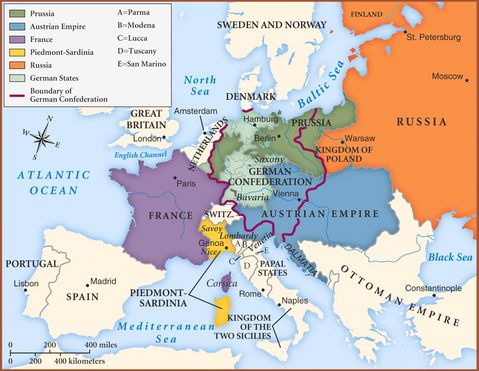Hello, it's Lucía again. Today it's my turn to do the journal, so let's try to do it well!
At the beginning of the class, we have revised the Congress of Vienna and its corresponding scheme we did on Tuesday. The main conclusions are:
– They restored absolutism after the exile of Napoleon to Elba.
– They created the Holy Alliance.
Here you have the map that Paqui uses in class:
Here you have the map that Paqui uses in class:
 |
| Source: zonu.com |
But, as the United Kingdom didn't agree with their purposes, they created the Quadruple Alliance, formed by the members of the Holy Alliance plus the United Kingdom; Austria had under its power central Europe, Russia had Eastern Europe and the United Kingdom controlled the seas routes and some islands.
 |
| These men are the leaders of the Holy Alliance. Source: |
 |
| Source: pinterest.com This photo shows the similarities of the Congress of Vienna and the fall of Napoleon, because when he came back from Elba and the Hundred Days Empire started, the Congress was taking place. |
LIBERALISM:
It’s an ideology that defends that humans are born free and with some rights guaranteed by the State (Social Contract). They agreed with the division of power (but power belonged to the citizens, who chose their representatives). The State couldn't intervene in economy.
The main trends in this ideology were:
– CLASSICAL LIBERALISM: only those who had a good level of wealth or owned properties couldvote (Census Suffrage)
– DEMOCRATIC LIBERALISM: everybody was equal before the law and could vote. (Universal Suffrage).
 |
| Sources: |
NATIONALISM:
It defended the right of the nations to decide by themselves and form independent States.
The main two conceptions of nation:
– CONSERVATIVE OR EXCLUDING: they accepted only those who share some common features, like for example language or the "race". (The concept of race in humans doesn't exist, remember this and spread it, please, you're helping to create a better world ♥♥).
– PROGRESSIVE OR INCLUSIVE: they accepted all those who want to belong to the nation, if they accepted its laws.
Unfortunately, the predominant one was (and is) the excluding or conservative.
 |
| Source: |
--------------------------------------------------------------------------------------------------
NEW VOCABULARY HERE!
Attend: asistir.
Cape Colony: Colonia del Cabo.
Ceylon: Ceilán.
Quadruple Alliance: Cuádruple Alianza.
Balance of Powers: equilibrio de poderes.
Threaten: amenaza.
Turncoat: chaquetero.
Snatch: arrebatar, quitar violentamente.
Trend: tendencia.
Wealth: riqueza.
Classical Liberalism: Liberalismo clásico.
Democratic Liberalism: Liberalismo radical o democrático.
Self-determination: autodeterminación.
Adress to the German Nation: Discursos de la nación alemana.
AND THAT'S ALL FOLKS! ♥
Hello Lucía,
ReplyDeleteYou have done a very good work and there are few mistakes. I want to explain some:
- Agree means " estar de acuerdo". So you have to say "I agree/ I disagree", but you can't say "I am agree/ I am disagree".
- Despite means "A pesar de". "Instead of " means "en lugar de". I think you wanted to use the first expression, instead of the second one.
I have also liked what you have written about "race". I totally agree with you and hope that ypu contribute to spread this idea too.
Here you have the corrections:
...the United Kingdom controlled the sea(s) routes and some islands.
This photo shows the similarities of the Congress of Vienna and the fall of Napoleon, because when he came back from Elba and the Hundred Days Empire started, the Congress was taking place/ being celebrated
But despite these alliances, they couldn't stop the revolutionary ideas so after the Congress two new ideologies spread out.
LIBERALISM:
it’s an ideology that defends that humans are born free and with some rights guaranteed by the State (Social Contract). They agreed with the division of power (but power belonged to the citizens, who chose their representatives). The State couldn't intervene in economy.
The main trends in this ideology were:
– CLASSICAL LIBERALISM: only those who had a good level of wealth or owned properties could vote (Census Suffrage)
– DEMOCRATIC LIBERALISM: everybody was equal before the law and could vote. (Universal Suffrage).
NATIONALISM
– PROGRESSIVE OR INCLUSIVE: they accepted all those who want to belong to the nation, if they accepted its laws.
I said that in the past France was a country that accepted everybody and refugees from all over the world came there, but now this has changed and everybody limits or hampers the entrance of immigrants or refugees. Really unfair and sad :(
See you!